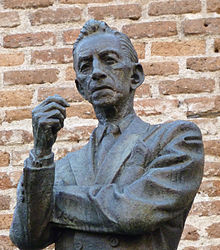Agustín Lara
| Agustín Lara | |
|---|---|
| Composer | |
 Statue of A. Lara in Madrid, by sculptor Humberto Peraza | |
| Born | October 30, 1900 Tlacotalpan, Veracruz[1] |
| Died | November 6, 1970(1970-11-06) (aged 70) Mexico City |
| Wives | María Félix[2] Yolanda Santacruz Gasca Rocio Duran[3] Clara Martínez[4] Vianey Lárraga |
Issue Enrique Álvarez Félix (stepson) Gerardo Agustín Lara Santacruz Agustín Lara Lárraga (adopted son) | |
| Father | Joaquín M. Lara[5] |
| Mother | María Aguirre del Pino de Lara |
Ángel Agustín María Carlos Fausto Mariano Alfonso del Sagrado Corazón de Jesús Lara y Aguirre del Pino[6] (Spanish pronunciation: [aɣusˈtin ˈlaɾa]; October 30, 1897– November 6, 1970), known as Agustín Lara was a Mexican composer and interpreter of songs and boleros. He is recognized as one of the most popular songwriters of his era. His work was widely appreciated not only in Mexico but also in Central and South America, the Caribbean and Spain. After his death, he has also been recognized in the United States, Italy and Japan.
Notable performers of his work include Pedro Vargas who was a friend, Juan Arvizu, Nestor Mesta Chayres, Pedro Infante, Javier Solis, Julio Iglesias, Manuel Mijares, Vicente Fernandez, Luis Miguel, Perez Prado, and Natalia Lafourcade among others.
Outside the Spanish speaking world, his most famous songs are certainly "Granada" and "Solamente Una Vez (You Belong to My Heart)", which have both been recorded by numerous international singers, including Enrico Caruso, Mario Lanza and Jose Carreras.
Contents
1 Biography
2 Family
3 Selected filmography
4 References
5 External links
Biography
Lara was born in Tlacotalpan, Veracruz. Later, the Lara family had to move to Mexico City, establishing their house in the borough of Coyoacán. After their mother died, Agustín and his siblings lived in a hospice run by their aunt. It was there that he had his first contact with music.
Lara's first musical composition was Marucha, written in honor of one of his first loves. In 1927 he already was working in cabarets. He subsequently moved to Puebla, but returned to Mexico City in 1928.[7] That same year he started working for the tenor Juan Arvizu as composer and accompanist. In September 1930, Lara began a successful radio career. At the same time he acted and composed songs for such films as Santa.

The Eng. Guillermo González Camarena, with Agustín Lara.
Lara's first tour, to Cuba in 1933, was a failure because of political turmoil on the island. Later, more successful tours in South America, as well as such new compositions as Solamente Una Vez (composed in Buenos Aires and dedicated to José Mojica), Veracruz, Tropicana, and Pecadora increased his fame.
By the beginning of the 1940s, Lara was well known in Spain. In 1965, the Spanish dictator Francisco Franco, gave him a house in Granada to show his appreciation of Lara's songs with Spanish themes, such as Toledo, Cuerdas de mi Guitarra, Granada, Seville and Madrid. He received additional honors and decorations from around the world.
His career was portrayed in the 1959 Mexican film The Life of Agustín Lara.
In 1968, Lara's health began to decline rapidly; an accident that fractured his pelvis further aggravated his condition. On November 6, 1970, Lara died.[8] He was buried in Mexico City. By the time of his death, Lara had written more than 700 songs.
Family

Grave of Agustín Lara
Agustín was a son of Joaquín Lara and his wife María Aguirre y Pino.[5][9] He had an aunt named Refugio Aguirre del Pino and younger sister, María Teresa Lara.[10][11] He married María Félix and Rocío Durán (whom he adopted)[12] and was a stepfather to the actor Enrique Álvarez Félix, who died in 1996.[13]
Sons of Lara are Gerardo Agustín Lara Santacruz, with sixth wife Yolanda Santacruz Gasca)[14] and Agustín Lara Lárraga (biological son of actress Vianey Lárraga,[15] one of Lara's wives).[16]
Lara also had a stepmother.
Selected filmography
Melodies of America (1941)
Mujer en condominio (1958) including the song "Arroyito", composed and sung by Lara in the film
References
^ Life and family of Agustín
^ Félix (1993), Volume 2, page 53.
^ "Yolanda Santacruz Gasca". Eldictamen.mx. 2012-10-26. Retrieved 2014-01-30..mw-parser-output cite.citation{font-style:inherit}.mw-parser-output q{quotes:"""""""'""'"}.mw-parser-output code.cs1-code{color:inherit;background:inherit;border:inherit;padding:inherit}.mw-parser-output .cs1-lock-free a{background:url("//upload.wikimedia.org/wikipedia/commons/thumb/6/65/Lock-green.svg/9px-Lock-green.svg.png")no-repeat;background-position:right .1em center}.mw-parser-output .cs1-lock-limited a,.mw-parser-output .cs1-lock-registration a{background:url("//upload.wikimedia.org/wikipedia/commons/thumb/d/d6/Lock-gray-alt-2.svg/9px-Lock-gray-alt-2.svg.png")no-repeat;background-position:right .1em center}.mw-parser-output .cs1-lock-subscription a{background:url("//upload.wikimedia.org/wikipedia/commons/thumb/a/aa/Lock-red-alt-2.svg/9px-Lock-red-alt-2.svg.png")no-repeat;background-position:right .1em center}.mw-parser-output .cs1-subscription,.mw-parser-output .cs1-registration{color:#555}.mw-parser-output .cs1-subscription span,.mw-parser-output .cs1-registration span{border-bottom:1px dotted;cursor:help}.mw-parser-output .cs1-hidden-error{display:none;font-size:100%}.mw-parser-output .cs1-visible-error{font-size:100%}.mw-parser-output .cs1-subscription,.mw-parser-output .cs1-registration,.mw-parser-output .cs1-format{font-size:95%}.mw-parser-output .cs1-kern-left,.mw-parser-output .cs1-kern-wl-left{padding-left:0.2em}.mw-parser-output .cs1-kern-right,.mw-parser-output .cs1-kern-wl-right{padding-right:0.2em}
[permanent dead link]
^ Lara’s biography
^ ab Una Pasión y DOS Quijotes: Don Quijote de la Mancha y Agustín Lara by Beila Zider.
^ "La madre de todas las trivias". M Semanal (in Spanish). January 29, 2012. Archived from the original on February 5, 2012. Retrieved January 30, 2012.
^ Araújo, Samuel (1999). "The Politics of Passion: The Impact of Bolero on Brazilian Musical Expressions". Yearbook for Traditional Music. 31: 44. doi:10.2307/767972.
^ "AGUSTIN LARA, POET AND COMPOSER, DIES". The New York Times. November 7, 1970.
^ José Garcia. "Agustín Lara and Tlatlauquitepec". Pueblo-tlatlauquitepec.blogspot.com. Archived from the original on February 27, 2014. Retrieved 2014-01-30.
^ "Maria Teresa Lara". IMDb.
^ "Song: ''Piensa en mí''". Secondhandsongs.com. 1936-02-22. Retrieved 2014-01-30.
^ "Life of Lara". Archivo.elnuevodiario.com.ni. Archived from the original on February 20, 2014. Retrieved 2014-01-30.
^ Félix, María (1994). Todas mis Guerras. Clío. p. 84. ISBN 968-6932-08-9.
^ Luis Miguel Madrid (2004-10-21). "Rodríguez, Dionisio. Agustín Lara "El Schubert Jarocho"". Babab.com. Retrieved 2014-01-30.
^ "Agustín Lara".
^ Biography of Agustín Lara
| Wikimedia Commons has media related to Agustín Lara. |
External links
- SACM (Spanish
- Biblioteca Babab (Spanish)
Agustín Lara discography at Discogs
Agustín Lara on IMDb- Sound recordings of boleros written by Agustín Lara on Archive.org
"Agustín Lara". Find a Grave. Retrieved September 3, 2010.